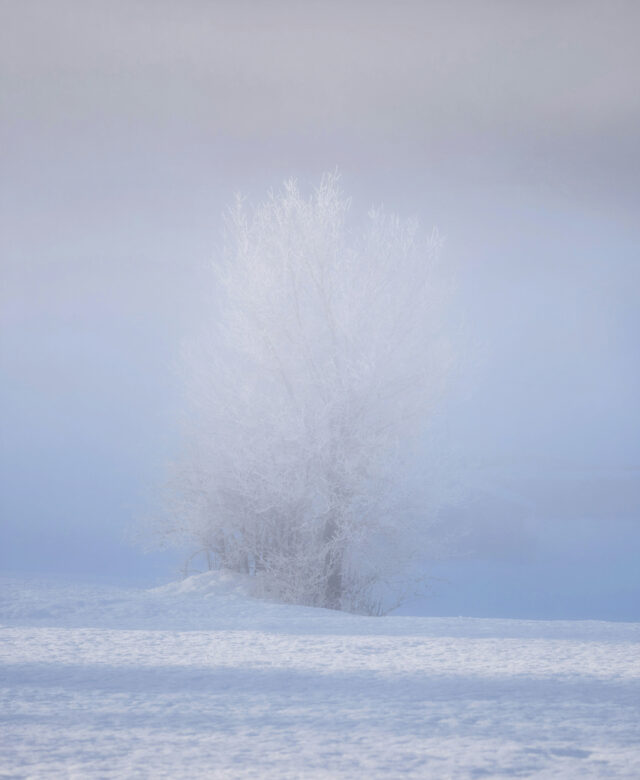
By Amely Greeven
Spend some slow winter nights tucked in a cabin, or otherwise away from brightly lit bustle, and you might start to fall under the spell of winter’s darkness. The night draws in early and there’s not much to do; lights are dim, maybe a fire is flickering; you feel sleepy ridiculously early, and soon your bed feels utterly irresistible. If you’ve kept the 21st century at bay—no glaring screens or LEDs or media chatter—you dip into long, deep sleep filled with vivid dreams. Or perhaps you stay up, relishing the fire logs crackling and a dog or cat snoozing nearby. It feels deliciously intimate and peaceful and witchy.
This is what it feels like to become a seasonal being, a person in close relationship with Mother Nature’s rhythms. The benefits are profound. Physically, you get more time to rest and repair, thanks in large part to the hormone of darkness, melatonin. Longer nights and sleep give it more time to exert its powerful anti-inflammatory and protective cellular effects. According to naturopathic physician Dr. Catherine Clinton, ample melatonin also helps maintain summertime stores of fat-soluble vitamin D for longer—the two hormones working in a dynamic relationship like the moon to the sun. Psychically, you deepen in relationship to yourself. Night is the yin to daytime’s yang, and winter, the dark, inward yin season to summer’s active yang, turns nighttime even more inward, softening you into a state of receiving so you can gain insight and intuition from beyond your conscious mind. Winter nights are when we can tend to the soil of our inner lives, enriching it and protecting it from erosion.
So why do most of us—once we’ve left the sweet retreat or cozy cabin—put up such a fight? Los Angeles-based holistic health practitioner Rachael Smith, who centers much of her work on supporting natural circadian biology, says, “My clients will step up to an intense dietary overhaul and be totally compliant with that. But when it comes to aligning with nature, to turning off bright lights and putting down the phone and having a quiet night of early bed, it’s a very different story.” Holistic psychiatrist Ellen Vora, MD, who lives and works in Manhattan, concurs. “So much of our approach to wellness is operating on yang momentum, even if on fumes. We want to live in endless summer, and the prescription to winter, to rest, do less, and do things that make us softer, rather than thinner or stronger or better, feels like a bridge too far.”
Perhaps it’s indicative of a pervasive unease with the dark. Smith says she wonders if humans are so doggedly lighting up long, dark nights that we are changing our cellular memory of what “cozy” feels like—to the detriment of our health and hormones. The addictive hit of bright devices can make candlelit hygge a distant artifact. Ellen Vora contends that as a culture, we are becoming uncomfortable with “seeing in the dark,” with its invitation into mystery, the unknown, even dissolution and death. “Darkness feels inactive, even though it’s not,” she says, something hyper-productive humans can struggle with.
The invitation this season is to simply make amends. Sure, befriending the dark might be easier in the countryside than in a city that never sleeps. But it’s far from impossible. Vora recommends getting early outdoor sunshine—a standard biohack that triggers a cascade of hormones including serotonin that help make melatonin later—and then trying something next level: Track your bedtime to sunset. “Wind down for bed around three hours after sunset, more or less,” she says, “even if that feels really early in midwinter.” It sounds shockingly uncool, but also—quietly revolutionary. “I call this hibernation season for a reason,” Vora adds. “It’s OK for your body to want more rest.” That doesn’t make you somehow “seasonally depressed” or “wrong.” Just be sure to use quality blue-light-blocking glasses or amber lighting as your support tool earlier in the evening, and even—gasp—trade devices for a book. Notice if you feel sleepier, then, importantly, allow that to guide you. Be a seasonal being and let winter’s yin lead you home.





